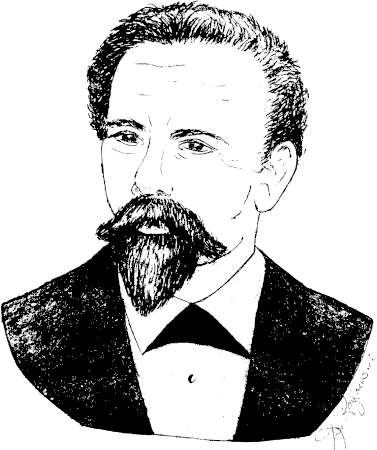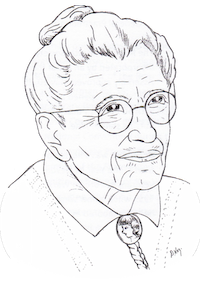Although he was not born in Milford, Joseph Roswell Hawley would become one of the most famous residents of Woodmont, Milford and Connecticut. His career was impressive. He was a gifted writer and public speaker. He served as a governor of Connecticut, as well as a U.S. Representative and U.S. Senator. He was an attorney, newspaper editor and distinguished Civil War hero.
Born in Stewartsville, NC, on Halloween in 1826, Hawley was the son of Mary McLeod and the Reverend Francis Hawley. Hawley’s mother was born in Fayetteville, NC, and his father was born in Farmington, CT. His father had gone to North Carolina as a traveling salesman and he later became a Baptist minister.
Rev. Hawley was strongly opposed to slavery and, as a result was threatened by individuals and mobs in the South. He returned to Connecticut with his family when Joseph was 11. But his father’s abolitionist stance had a strong influence on his son’s character and politics.
The Hawleys, with Joseph and his two sisters, settled in Connecticut. Joseph attended Hartford Grammar School and graduated from Hamilton College, NY, in 1847. He studied law with John Hooker, was admitted to the bar in 1850 and joined Hooker as a partner in his Hartford firm.
From his law office, he founded the Connecticut Republican party in 1856, along with several prominent politicians. At the time, it was a liberal party, in particular, a faction known as the Radical Republicans, who were committed to emancipation of the slaves, and later, equal treatment including the right to vote.
In 1857 Hawley became editor of the Hartford Evening Press, which allowed his political voice to reach a large audience and laid the foundation for what would become an impressive political career.
Hawley was an early supporter of Abraham Lincoln. After the attack by the Confederate states on Fort Sumter in South Carolina, when President Lincoln called for volunteers, Hawley was the first persons from Connecticut to enlist in the Union Army. At the age of 34, he was also one of the oldest men to enlist. But Hawley proved to be a courageous leader and a skilled tactician. He fought in 13 battles during the Civil War and rose quickly in rank. Hawley was called “Fighting Joe” for his ability to lead without fear and stir pride and patriotism in his men.
By the time he was discharged in 1866, Hawley had risen to the rank of major general. He returned to the Nook Farm neighborhood of Hartford, where he and his wife were neighbors and friends of Mark Twain, Harriet Beecher Stowe (his wife’s cousin) and other intellectuals, reformers and political leaders. He entered politics and was elected Governor of Connecticut in 1866. However, he failed in his bid to be reelected, in part due to his firm stance on full civil liberties for freed slaves.
He returned to journalism, and when his newspaper merged with the Hartford Courant in 1867, he became editor and part owner. Hawley gave the Hartford Courant a strong Radical Republican voice.
Hawley was appointed to fill a vacancy in the U.S. House of Representatives and was reelected once, serving from 1872-1875. He failed to win after that term but was reelected again in 1879, serving until 1881.
Hawley went on to serve in the U.S. Senate for 24 years (1881-1905). In the 1890s, he purchased a summer cottage on a street in Woodmont that was then called Vue de L’eau. It was renamed Hawley Avenue in his honor in the early 20th century.
Eventually Senator Hawley’s Woodmont house became his only Connecticut residence as he lived there in the summer and spent the winters in Washington, D.C. His house at 96 Hawley Avenue stood until 2016, when local preservationists failed in their attempt to prevent the house from being torn down.
Hawley was a strong, vigorous and healthy man throughout his life. He was honest to the point of bluntness, and often held uncompromising positions on social, political and moral issues. He was known as a liberal social reformer and a popular, generous, warm person. He had a reputation as a man of integrity and was a life-long supporter of the nation’s historic welcome of foreign immigrants.
Hawley married twice.
On Christmas day in 1855, he married Harriet Ward Foote Hawley. They later adopted her niece. After her death in 1886, he married English-born Elizabeth Horner, with whom he had two daughters.
Governor Joseph R. Hawley died in Washington, D.C., in 1905, and is buried in Cedar Hill Cemetery in Hartford. His death was national front-page news and he lay in state at the U.S. Capitol.
A few months later, the Connecticut legislature approved a bill to build a memorial in his honor on the grounds of the capitol. The Hawley Memorial is a six-foot wide bronze medallion with a profile of Hawley in military attire. The inscription reads, “Patriot, Soldier, Statesman.



